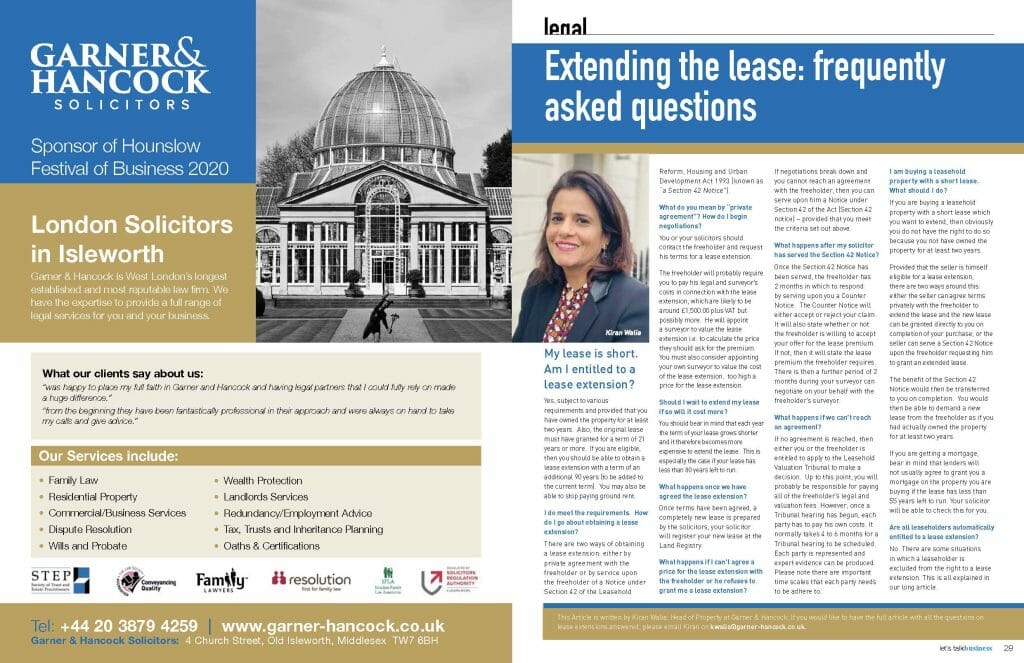Lease Extensions
Our Lease Extension service provides invaluable advice to leaseholders and freeholders to get the best price

Extending The Lease: Frequently Asked Questions
Yes, subject to various requirements and provided that you have owned the property for at least two years. Also, the original lease must have been a long lease e.g. granted for a term of 21 years or more. If you are eligible, then you should be able to obtain a lease extension with a term of an additional 90 years (to be added to the current term). You may also be able to stop paying ground rent.
There are two ways of obtaining a lease extension: either by private agreement with the freeholder or by service upon the freeholder of a Notice under Section 42 of the Leasehold Reform, Housing and Urban Development Act 1993 (known as “a Section 42 Notice”).
Possibly if the freeholder is willing to grant an extension to you. The point is that he does not have to do so if you are not eligible.
You or your solicitors should contact the freeholder and request his terms for a lease extension.
If the freeholder is willing to cooperate with you and grant the lease extension, he will write to you and let you know the premium (i.e the price) he wants you to pay for the lease extension, the term of the years he is willing to grant to you and the ground rent.
The freeholder will probably require you to pay his legal and surveyor’s costs in connection with the lease extension, which are likely to be around £1,500.00 plus VAT but possibly more. He will appoint a surveyor to value the lease extension i.e. to calculate the price they should ask for the premium. You must also consider appointing your own surveyor to value the cost of the lease extension. This is very important so as to ensure that you are not paying too high a price for the lease extension.
As mentioned above, the cost of the lease extension has to be professionally valued but usually runs to several thousand pounds. You will need to instruct a surveyor and a solicitor to act for you and you will also be expected to pay the freeholders’ surveyor’s and legal costs.
You should bear in mind that each year the term of your lease grows shorter and it therefore becomes more expensive to extend the lease. This is especially the case if your lease has less than 80 years left to run. At this point, the freeholder becomes entitled to charge you an extra payment known as “marriage value”. Marriage value is the amount of the surplus value produced by taking the value of the extended lease at a peppercorn ground rent and deducting both the existing short leasehold interest held by you as the leaseholder, and the freeholder’s current interest.
Once terms have been agreed, a completely new lease is prepared by the solicitors, one copy is signed by you and the one copy is signed by the freeholder. Once you have paid the lease premium and the other costs mentioned above, your solicitor will register your new lease at the Land Registry.
Please note that if you have a mortgage, your solicitor will need to obtain your lender’s consent. Some lenders charge a fee for supplying this consent.
If negotiations break down and you cannot reach an agreement with the freeholder, then you can serve upon him a Notice under Section 42 of the Act – provided that you meet the criteria set out above.
You do not have to begin the process by negotiating with the freeholder. You can, if you wish, begin the process by serving a Notice under Section 42 of the Act mentioned below but remember that in order to be eligible to do, you must meet the criteria set out above.
This is relatively simple but can be time-consuming. You will need a surveyor to value the cost of the lease extension for you and you will also need to appoint a solicitor to act for you. Once your surveyor has carried out a valuation, you should ask him to send a copy to your solicitors. They will then serve a Section 42 Notice upon the freeholder stating the lease premium which you would be prepared to pay for the lease extension.
Once the Section 42 Notice has been served, the freeholder has 2 months in which to respond by serving upon you a Counter Notice. The Counter Notice will either accept or reject your claim. It will also state whether or not the freeholder is willing to accept your offer for the lease premium. If not, then it will state the lease premium the freeholder requires. There is then a further period of 2 months during your surveyor can negotiate on your behalf with the freeholder’s surveyor.
If no agreement is reached, then either you or the freeholder is entitled to apply to the Leasehold Valuation Tribunal to make a decision. Up to this point, you will probably be responsible for paying all of the freeholder’s legal and valuation fees. However, once a Tribunal hearing has begun, each party has to pay his own costs. It normally takes 4 to 6 months for a Tribunal hearing to be scheduled. Each party is represented and expert evidence can be produced.
If negotiations do break down and you are going to apply to the Tribunal, one of the most important points you should note is the time scale. If the freeholder has responded by serving a Counter Notice within the required time scale, then the leaseholder must make an application to the Tribunal not later than 6 months from the date of the Counter Notice. If the freeholder has failed to respond to the Section 42 Notice by serving a Counter Notice in reply, then the leaseholder must apply to the Tribunal not later than 6 months from the date by which the freeholder should have served the Counter Notice.
If you do not apply to the Tribunal within six months from the date of the freeholder’s Counter Notice, then you will have in effect withdrawn your Section Notice. Otherwise you can expressly withdraw your Notice at any time. Bear in mind that if you do withdraw your Notice, you will still be liable to pay the freeholder’s legal and surveyor’s costs and you cannot make a new application to the Tribunal for another year.
Once terms have been agreed, a completely new lease is prepared by the solicitors, one copy is signed by you and the one copy is signed by the freeholder. Once you have paid the lease premium and the other costs mentioned above, your solicitor will register your new lease at the Land Registry. Please note that if you have a mortgage, your solicitor will need to obtain your lender’s consent. Some lenders charge a fee for supplying this consent.
If this happens, then rather than applying to the Leasehold Valuation Tribunal, your solicitor can apply to the Court for a “Vesting Order”. If the Court is satisfied that you are eligible to extend your lease, then it will in effect, grant the Lease to you in the absence of the freeholder. The Court will usually ask the Leasehold Valuation Tribunal to determine the lease premium that you should pay.
If you are buying a leasehold property with a short lease which you want to extend, then obviously you do not have the right to do so because you not have owned the property for at least two years.
Provided that the seller is himself eligible for a lease extension, there are two ways around this: either the seller can agree terms privately with the freeholder to extend the lease and the new lease can be granted directly to you on completion of your purchase; or the seller can serve a Section 42 Notice upon the freeholder requesting him to grant an extended lease.
The benefit of the Section 42 Notice would then be transferred to you on completion. You would then be able to demand a new lease from the freeholder as if you had actually owned the property for at least two years.
If you are getting a mortgage, bear in mind that lenders will not usually agree to grant you a mortgage on the property you are buying if the lease has less than 55 years left to run. Your solicitor will be able to check this for you.
No. There are some situations in which a leaseholder is excluded from the right to a lease extension. These are as follows:
- The freeholder is a charitable housing trust and the flat is provided by the charity as part of its charitable work;
- The leaseholder has sub-let his flat on a long lease;
- The lease is a business lease.
Also, some properties are completely excluded from the right to a new lease. These are as follows:
- Buildings within a cathedral precinct.
- National Trust properties.
- Properties owned by the Crown
Although the Crown is not bound by the legislation the Minister has made a statement to the House of Commons that the Crown will be prepared to comply with the principles of it.
This Article is written by Brenda Zoller, the property Partner at Garner & Hancock
Law Correct as at January 2019
Request for a Legal Consultation
Garner & Hancock realise that the prospect of pursuing a legal matter can be challenging, so we offer an initial phone consultation to discuss your options, and to give you information that will help you make the right choices affecting your case.
Our Guarantee
We believe our business begins and ends with you and your needs, as our client. Therefore, we are committed to providing the best client care and advice which will give you confidence that your matter is handled with the utmost care.
How Can We Help?
We are here to help! Feel free to contact us anytime for a consultation on your legal matters.
